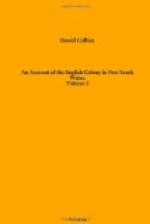Every year’s experience proved, that this island never would be of the utility which might be expected from the very great expense that was incurred on its account. It was probable, that this expense had not been adverted to in England; for all the bills drawn there were sent to New South Wales to be consolidated into bills upon the treasury; by which means the expenses of the principal settlement appeared to be far more considerable than in fact they were. The boast of its containing timber and flax fit for naval purposes, sufficient to construct and equip a navy, falls to the ground, when it is considered that the whole island does not contain a single harbour, cove, or inlet, fit to shelter a boat, much less a ship; but that it is surrounded by a dangerous coral reef, which has proved the loss of one King’s ship, and many lives. Besides, the soil of New South Wales produces timber and flax perfectly calculated for all naval purposes, and in sufficient abundance. The single advantage that this island presents is, as has been mentioned before, its proving a place of punishment to such notorious offenders in the seat of government as there escape the gallows; and for this purpose a small civil and military establishment might be maintained at a much less expense than the present.
If an idea may be hazarded, Van Diemen’s Island holds out in every respect a more advantageous spot for a settlement, than this parched, unattainable island; and were it not for the expense already incurred there, it would be advisable to remove the whole of that settlement thither; where, from the account given by Captain Flinders, and Mr. Bass, they would be as likely to remain unmolested by natives as they are at Norfolk Island, and would possess the superior benefits of a temperate climate and capacious harbour.
In addition to the advantages likely to be obtained in New South Wales by the culture of the flax plant, the breed of sheep had been considerably improved by crossing the smaller Bengal with the larger Cape sheep. The fleece produced from this mixture was excellent; and a specimen of woollen cloth fabricated of it was sent to England. One end of a web of linen, wove from the wild flax of the country, was crossed with a thread spun from the bark of a tree; and a web from that bark was crossed, in the specimen sent home, by a thread of wool. All these were made under many difficulties; but they answered the purpose of showing what might be done, with proper tools, at a future period. There was not any doubt, but that the flax plant would considerably improve by cultivation; and the manufacture of woollens promised to be of great benefit to the settlement, whenever a sufficiency of the raw materials was collected. Necessity has been long known as the parent of resources, and the poverty of the public stores in the article of clothing had prompted these experiments of the wool, the flax, and the bark.
The discovery of the vast strata of coal must be reckoned among the new lights thrown upon the resources of the colony. The facility that this presents in working the iron ore* with which the settlement abounded, must prove of infinite utility whenever a dock-yard shall be established here; and the time may come, when the productions of the country may not be confined within its own sphere.




